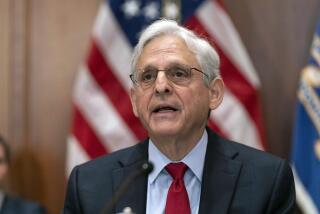A mixed review of Iraqi security
- Share via
WASHINGTON — The Iraqi National Police will need an overhaul to rid the ranks of sectarian bias, according to an assessment of the Iraqi security forces to be released next week.
The report -- commissioned by Congress and headed by retired Marine Gen. James L. Jones -- gives relatively good marks to the Iraqi army, according to an administration official briefed on the report. It says the army has been well-equipped and -trained and is now conducting operations effectively, the official said.
Its assessment of the police is far more pessimistic. The report suggests starting over with the National Police, possibly by reconfiguring it as a smaller force.
The Iraqi National Police, under the Ministry of Interior, number about 25,000. The report does not recommend such an overhaul of the 325,000 local and provincial police.
The findings of the Iraqi Security Forces Independent Assessment Commission, known informally as the Jones report, comes as President Bush prepares his own assessment of progress in Iraq and is receiving a series of appraisals from military advisors. Bush is to meet with members of the Joint Chiefs of Staff today in the Pentagon’s “tank,” as their secret conference room is called.
U.S. military officials have long recognized problems with the Iraqi police, saying that many units were controlled by various sectarian factions. The United States has made several efforts at improving the police, even declaring 2006 the “year of the police” and promising to dramatically increase American training and oversight.
Though acknowledging the problems, the Pentagon on Thursday rejected the Jones recommendation to disband the Iraqi National Police, saying that military officials did not think that starting over would be the best way to improve the force.
“The fact that there is a problem of rampant sectarianism in the National Police shouldn’t come as a surprise to anyone,” said Geoff Morrell, the Pentagon press secretary.
Morrell said Iraqi and U.S. officials had been working together to retrain and rebuild units, and noted that nine battalion commanders had been replaced. “We think ultimately [retraining] could turn around the Iraqi National Police and rid them of their sectarian biases.”
The report is far more positive about the capabilities of the Iraqi army, although it says the force has logistic problems and units have problems receiving adequate supplies.
Defense Secretary Robert M. Gates and members of the Joint Chiefs of Staff were briefed Wednesday by Jones about his conclusions. Members of the Jones commission contacted Thursday said that they had agreed not to discuss the report’s contents before its release.
The Jones report, to be presented to the Senate next week, is one of two independent reports commissioned by Congress in advance of the assessment by Gen. David H. Petraeus, the top American commander in Iraq.
The U.S. Government Accountability Office is scheduled to release a report next week on the Iraqi government’s progress in meeting 18 benchmarks set by Congress. A draft of that report was more negative about Iraq’s army than the Jones assessment. The GAO found the number of Iraqi army units capable of operating independently declined from 10 in March to six last month. It found that three of the benchmarks had been achieved, two had been partly attained and 13 had not been met.
Pentagon officials objected to the draft and said that the GAO reached the wrong conclusion on three benchmarks.
Contrary to the GAO’s findings, Pentagon officials say that the Iraqi government has supplied brigades for Baghdad security and has not prevented U.S. forces from entering particular neighborhoods or enclaves. The Pentagon also says the Iraqi government should get a partial passing grade for reducing sectarianism in their military forces.
Morrell said that the Pentagon welcomed the two outside reports but that Petraeus’ assessment was more important. “The assessment that matters most is from the commanders on the ground who have been living and breathing this for months, rather than people who parachute in for outside assessments,” Morrell said.
Petraeus and Ryan C. Crocker, the U.S. ambassador to Iraq, are scheduled to present their assessment to the House on Sept. 10 and to the Senate on Sept. 12, according to a congressional staffer.
This week Pentagon officials said that all of the Joint Chiefs of Staff would have an opportunity to present their views on Iraq to Bush as the president deliberates his Iraq strategy.
The meeting between the Joint Chiefs and the president was announced by Maj. Gen. Richard Sherlock, the chiefs’ director for operational planning. “The Joint Chiefs will be able to provide the president with their unvarnished recommendations and their assessments of current operations. They’ll make those individually and they’ll make those in private,” Sherlock said.
White House spokesman Gordon Johndroe said Bush intended to speak to the chiefs about Iraq and the condition of the U.S. armed forces. The Joint Chiefs were expected to discuss the strain that Iraq deployments have been putting on military families and the need to increase the size of the armed forces.
Administration and military officials have said the Joint Chiefs favor moving to a sharply smaller force in Iraq next year.
Army Chief of Staff Gen. George W. Casey Jr. has been speaking out increasingly often about the stress the high level of deployments in Iraq and elsewhere have put on the Army. “Our force is stretched and out of balance,” he said Thursday. “The tempo of our deployments are not sustainable; our equipment usage is five times the normal rate and continuously operating in harsh environments.”
--
More to Read
Sign up for Essential California
The most important California stories and recommendations in your inbox every morning.
You may occasionally receive promotional content from the Los Angeles Times.










